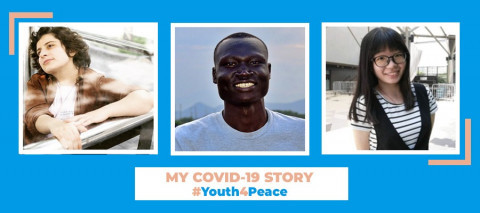
GCED Basic Search Form
Quick Search
Вы здесь
Новости

Throughout the COVID-19 pandemic, social media and online communication have become essential tools for maintaining social connections. In contrast, this crisis has also witnessed an increase in online hate speech, racism, xenophobia, Islamophobia, antisemitism and other violent narratives related to intolerance and discrimination.
Despite this, many young people have been independently promoting positive narratives and engaging in peacebuilding activities during the COVID-19 crisis. In April 2020, UNESCO launched the “My COVID-19 Story” campaign to provide a space for young women and men around the world to share their views, experiences and initiatives. Many dimensions have resulted from these 150+ submissions.
Youth-Led Transformative Change
Several stories reference the hate speech targeting individuals perceived as ethnically Chinese or Asian. Zhong (17), a high school student from China, explains “Misleading, biased information and conspiracy theories have resulted in hatred and racism.”
Kellie (12), an IB student from China, similarly describes memes and Twitter hashtags that label Chinese people as murderers.
Zhang (19) a student from Singapore, responds to this by interviewing people around the world to create a documentary to “decrease discrimination and xenophobia we see online and in real life.”
Aida (19), a politics and international relations student from Kazakhstan, speaks specifically about the disinformation which has “proclaimed conspiracy theories which were playing on our emotions, suggesting that the institutions that were supposed to protect us somehow did not.” Aida understands that she can take action if institutions fail to do so and has begun volunteering for UNICEF Kazakhstan’s informative online campaign to fight disinformation.
Empathy, Solidarity and Resilience
COVID-19 has given youth the opportunity to strengthen empathy, solidarity and resilience skills to combat COVID-19-related hate speech and disinformation.
Adrel (23), a communications coordinator from the Philippines, notes how this crisis teaches empathy: although everyone is confronting the same pandemic “We are stronger when we face tough times together.” Adrel’s recognition of solidarity and teamwork is an important factor in change-making. This is also reflected in the thoughts of Moises (25), a medical researcher and designer from Mexico and Diarra (34), a program manager from Guinea. Diarra believes that solidarity exists because everyone is susceptible to the virus.
Madina (25), a Fulbright Fellow and Cultural Ambassador of Kenya to the US, expands upon Diarra’s logic: “The coronavirus doesn’t discriminate...we should all be kind to one another regardless of race, gender, religion...We are in this together.”
Ana (22), who works in cultural management in Mexico and Fahsai (17), a student from Thailand, act in solidarity by buying food for isolated community members to build a positive and compassionate environment.
Actively building empathy and solidarity, and strengthening resilience, are all various dimensions of the development of peacebuilding skills.
Virginia (20), a student from Italy, describes how empathy developed on social media through students sharing difficulties faced during COVID-19.
Teenergizer is a positive online community that Yana (22), from Ukraine, founded. Yana leads this online movement that gives youth information on psychological support, COVID-19 safety measures and sexual education. Throughout the pandemic, their broadcasts and training sessions reached over 2 million teenagers.
As with other age groups, youth who are most vulnerable must be prioritized.
Nhial (21), who is from Kenya and works with Kenya Media, recognizes this need, specifically at Kakuma Refugee Camp & Kalobeyei Integrated Settlement. Nhial collects information about the pandemic from verified sources and posts the information on social media or online education platforms to reduce the “high spread of rumors and misinformation which ultimately cause tensions/panic in the refugee/host communities.”
Farkhad (19), from the Kyrgyz Indigo team in Kyrgyzstan, supports the LGBTQIA+ community, another vulnerable population. His team offers online support from psychologists, human rights advocates and lawyers to create a supportive community for LGBTQIA+ when experiencing hatred and violence, especially during this difficult time.
All these testimonies show that peacebuilding skills can be learned through lived experiences. The COVID-19 pandemic, although full of hardships, has provided young people with an opportunity to further develop these skills.
This universally shared experience of COVID-19 is allowing young people, demonstrating positive resilience, to make transformative change within their societies and to promote PEACE.
Be part of the My COVID-19 Story campaign!
- Write your story! Click here to write it
- Create your video! How? Sign up and do it here
We will share your stories on UNESCO’s social media channels (Twitter, Facebook and Instagram), our website and through our networks across the world.
See also
- UNESCO Youth Programme
- UNESCO-UNOCT Project on the Prevention of Violent Extremism through Youth Empowerment
- COVID-19 - Protect human health and dignity, respect universal values
- 'Dangerous speech' fuelled by fear in crises can be countered with education
- Plan of Action to Prevent Violent Extremism
- United Nations Guidance Note on Addressing and Countering COVID-19 related Hate Speech
- UNOCT – Reference Guide. Developing National and Regional Action Plans to Prevent Violent Extremism
- Secretary-General's statement on the effect of the COVID-19 pandemic on Children
- The missing peace: independent progress study on youth and peace and security
URL:
https://en.unesco.org/news/my-covid-19-story-peacebuilding-skills
